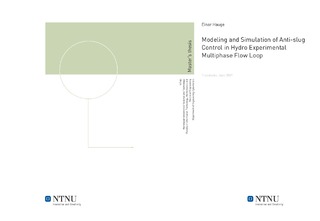Modeling and Simulation of Anti-slug Control in Hydro Experimental Multiphase Flow Loop
Master thesis
Permanent lenke
http://hdl.handle.net/11250/259852Utgivelsesdato
2007Metadata
Vis full innførselSamlinger
Sammendrag
Handling slug flow is a matter of necessity in the oil and gas industry. Large slugs cause problems at the production platform by overfilling the first stage separator leading to poor separation and pressure increase, which again could lead to more flaring or even complete process shut-down. Using the riser base pressure as the controlled variable has been shown in several academic papers to have a stabilizing effect on the slug flow. In this thesis it has been concentrated on designing robust anti-slug controllers using this variable as the controlled variable. Experience from Hydro's multiphase rig at their Research Centre in Porsgrunn shows that re-tuning of anti-slug controllers during experiments is necessary to be able to keep the flow stabilized. This is caused by the change in process gain, which is large for operation around small valve openings and low for operation around large valve openings. An OLGA model was developed for this multiphase rig. This model was shown to predict the amplitude of the slugs and their frequencies fairly well, however, the transition point from stable flow to slug flow differed to a larger extent. Several gain scheduling controllers were designed and tested on this model. The best gain scheduling approach which was found was based on a gain scheduling regime controlling the riser base pressure in a secondary loop without integral action, with a slow primary loop controlling the valve opening (with integral action). The scheduling variable was a low-pass filtered measurement of the valve opening. This approach was also robust with respect to noise and lowered inlet rates.
